#witsfeesmustfall
Photo

Wits Theatre. #witsfeesmustfall #wits #drama #theatre #campus #jhb #jozi #education #Education #braamfontein (at Wits - University of the Witwatersrand)
0 notes
Text
The Revolution will be Tweeted!
This article will be speaking about how new cyber-networking platforms that have decentred and replaced the democratic and political frameworks of the Habermas Public Sphere. Using the #FeesMustFall movement on Twitter, as a nuanced social media network, it will show how cyberspace has shifted and undermined the autonomy of social governing discourse to create a hyperreality free of distance and time, but still advanced to collective ideas.
Twitter had a major role during the 2015 #FeesMustFall movement, and Stuart Thomas describes how the ‘South African students had used social media platforms to subvert traditional media’ (Thomas, 2015). This ‘tweeting revolution’ is one that first sprung a few years into this decade out of the Arab Spring that started on December 17, 2010. Mass organisational protests, to overthrow corrupt African government and presidential officials and their unfair legislatures out of power, were constructed and formulated on social media – especially Twitter – that shook the Middle East and that rest of Africa (Thomas, 2015). In a similar manner, South African students took to these online platforms to form and announce the shutting down and closure of South African university and college institutions, starting off with Wits University students rejecting a proposed 11% increase in tuition fees by the institution, #WitsFeesMustFall. Then it trended nationally to 18 other institutions in 8 other provinces joining in the revolution with titles like #RhodesMustFall #UCTMustFall #NationalShutDown (2015). Twitter became a driving social force where students planned the biggest student marches on the parliamentary houses in Cape Town and Johannesburg, Pretoria, and were then stopped and brutally attacked by state police with weapons (Thomas, 2015).
In this sense the Habermas Public Sphere can be seen a historical tool, that lies irrelevant to the postmodern practices such as the cyberspace. It explains itself as an area in social life where appointed individuals (that being of the elite and governing class, middle class and lower class) come together to openly discuss and identify societal issues, and through this discussion political action is influenced to provide for mass social needs (Habermas, 1984). These individuals would physically have to meet up at a remote location (others called it a ‘coffeehouse’) where they would have rational and critical discussions on current discourse practices within that great community. These debates involve reflexive exchanges of communication, critique of morally practiced valid claims, equally discursive inclusion, respectful listening and autonomy from administrative and economic power (Dahlberg, 2001; 84).
Mark Poster (1997; 209) proposes we abandon the idea of the Habermas public sphere since it has lost its validity in relation to the cyberspace, because communicative rationality here takes on a modernist form and rational subject, which is radically decentred in online communication platforms as its subjectivity becomes detach from the physically fixed and embodied context, and is therefore dispersed and multiplied through these digital platforms. This means that these physical and print collective discussions are a fixed and stable in identity (labelling all those that attend in their respective social classes), while cyber-networking platforms destabilise and detach the general identity of the publics sense of self. For example, the 2015 #FeesMustFall movement was inclusive of everybody that supported the cause, regardless of their social class or status. As a result, it detached the individuals sense of self, to make prominent the on-line trend #FeesMustFall.
Poster (1995) mentions two interlinking processes to evaluate cyberspace as a hyperreality that contributes to the outmoding and decentralizing of the public sphere in a postmodern communicative space. The first is “the dislocation and disembodiment of the subject of due to the disintegration of modernist perceptions of space and time, and (2) the fragmentation of the subject due to its proliferation and dispersal through simulation” (Dahlberg, 2001; 86).
Dislocation and Disembodiment speaks about how time frames have been radically relativized by the speed of digital transmission, and with this disintegration of time frames, perceptions of geographical distance and space have become radically distorted, where distance becomes irrelevant in on-line communication. Cyberspace therefore has a global digital dispersion that almost disregards space and time and operates everywhere (Waskul and Douglas, 1997). While the Public Sphere thrives on the rules of social class leaders meeting up at a specific time and location to discussion matters at hand, Twitter (as an on-line communicative platform) for example, shows how the #FeesMustFall movement as a social issue was discussed, argued and revolted against by not the limitation of a time and a place. The revolution was tweeted at any time and place, and no geographical boundaries could stop the trend from reaching institutions abroad, such as London and New York (Thomas, 2015). It thus becomes evident that the dislocation and disembodiment of the on-line experience undermines the unity of individualism and the capability to know one’s interests and relationship to the world at large.
Fragmentation speaks about reconfiguration of identity at many different points of time and space on on-line social networks, making it unstable, dispersed and multiplied (Poster, 1995; 15). Sherry Turkle (1995) states that an individual’s sense of ‘self’ is multiplied, and that this multiplication comes on-line presentation of self and identity fornication. This limitless multiplication is also encouraged by the dislocation and disembodiment of subjects – allowing them to create new identities at any time and place and how many times they wish to do so, thus “exposing the potential for hyperfluidity of self-enactment” (Waskul and Douglas, 1997, 394). Unlike the public sphere which requires individuals to simulate themselves in a physical sense and fails to account for the decentring of the subject, on-line social platforms, like Twitter, allow individuals to manifest different types of identities that may represent different times of ideas or more than one. For instance, some #FeesMustFall activates used and represented themselves on Twitter as student-helpers that received some the resources that protesting students had been asking for on Twitter (such as food, water, lighting and internet connectivity), and had it not been for these social media platforms they would have been left at an unequal disadvantage (Thomas, 2015).
In conclusion, even though cyberspace participants are unable to reflexively monitor and truly identify themselves, others and the world around them, not forgetting the causalities of their online actions, they can represent themselves as a collective idea that stands for one or more ideals. Through dislocation and disembodiment and fragmentation, the politically democratic and individualistic participatory ideals of the Habermas Public Sphere thus decentre the rational subject to the point where the sphere loses its validation.
REFERENCES
BIBLIOGRAPHY
Dahlberg, L. 2001. The Habermasian Public Sphere Encounters Cyber-reality. New Zealand: Massey University. 84-7.
Habermas, J. 1984. The Theory of Communicative Action. Vol. One, Reason and the Rationalization of Society. Boston: Beacon Press.
Poster, M. 1995. The Second Media Age. Cambridge: Polity Press.
Poster, M. 1997. Cyberdemocracy: Internet and the Public Sphere. In D. Porter (ed.), Internet Culture, 201-217. New York: Routledge.
Poster, M. 1999. Underdetermination. New Media & Society. 1, 1, 15.
Thomas, S. 2015. #FeesMustFall: how SA students are using social to subvert traditional media. Online, retrieved 17 October 2017: https://memeburn.com/2015/10/feesmustfall-how-sas-students-are-using-social-to-subvert-traditional-media-narratives/
Turkle, S. 1995. Life on the Screen: Identity in the Age of the Internet. New York: Simon and Schuster.
Waskul, D. and Douglas, M. 1997. Cyberself: The Emgergence of Self in On-Line Chat. The Information Society. 397.
0 notes
Text
youtube
Watch the American Climate Leadership Awards 2024 now: https://youtu.be/bWiW4Rp8vF0?feature=shared
The American Climate Leadership Awards 2024 broadcast recording is now available on ecoAmerica's YouTube channel for viewers to be inspired by active climate leaders. Watch to find out which finalist received the $50,000 grand prize! Hosted by Vanessa Hauc and featuring Bill McKibben and Katharine Hayhoe!
#ACLA24#ACLA24Leaders#youtube#youtube video#climate leaders#climate solutions#climate action#climate and environment#climate#climate change#climate and health#climate blog#climate justice#climate news#weather and climate#environmental news#environment#environmental awareness#environment and health#environmental#environmental issues#environmental justice#environment protection#environmental health#Youtube
6K notes
·
View notes
Photo
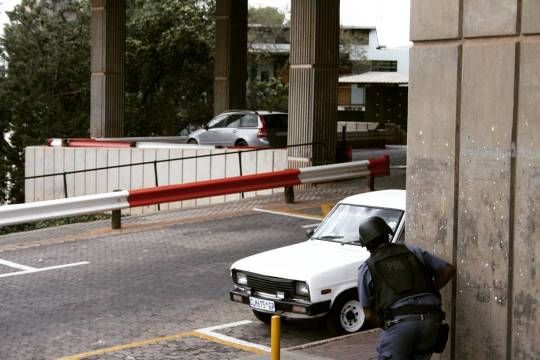
Policeman waits around the corner as students run from rubber bullets . #feesmustfall #witsfeesmustfall #wits #witsshutdown #studentaffairs #FreeEducationSA
1 note
·
View note
Text
Artists! Add your signature in support of #feesmustfall today
Artists! Artists who recognise that a free education is a human right. Artists with children who will benefit from the struggles being fought by this generation of students. Artists who will not stand by while this generation of students bleeds for rights that benefit all of us. Stand up and stand with students of #feesmustfall. Add your signature by emailing [email protected], send your protests against the militarisation of campuses nationwide. Today.
Artists in solidarity with FeesMustFall
The FeesMustFall student movements of 2015, that continue into 2016, represent a hugely important moment in post-1994 South Africa. We, the undersigned artists, stand in solidarity with the FeesMustFall movement calling for free education and an end to outsourcing.
Historically, artists have played important roles in political struggles for social justice, including in the anti-apartheid movements. As a new generation of artists, immersed in a new generation of struggles, we too must define our positions in relation to the political and social movements of our time. As artists who support the FeesMustFall movement, we call for artistic commitment that is based within the movement that does not see itself as separate to the everyday actions of students and workers. We also call on a cultural production that does not appropriate the popularity of the FeesMustFall movement towards self-serving ends.
We recognise that the students of FeesMustFall are risking their degrees, their careers, their bodies, their lives, their physical, emotional and psychological wellbeing in order to fight for a free education for all, for an end to outsourcing and employment conditions with dignity for workers. We support and appreciate their bravery and commitment, and their vision for a South Africa that we all want to live in.
22 years after democratic elections, universities are a site of systemic violence continually perpetrated against poor students, against black students, and against workers on campus. In building on a decade of student-worker solidarity, FeesMustFall has seen students and workers standing in solidarity with each other, tying free education to an end to outsourcing. This acknowledges that an enduring commitment to both of these ends holds the promise of pressing open space for this kind of work for justice on university campuses.
We call on all South African students to acknowledge the bravery of their peers, and to support the FeesMustFall protests. We ask that students recognise that the sacrifices they are asked to make for this cause are towards creating a more just and equal South Africa.
We call on all academics to support the students in their institution, and realise that minor inconveniences in their daily lives caused by the protest are in service of achieving a decolonised University.
We call on Universities to end violence against students and workers, to end police and private security presence on campus, before continuing engagement with students about their demands.
We call on police to treat their children with kindness and compassion.
We call on parents to support their children. We know parents want their children to be safe, happy, and successful. We know the sacrifices parents have made to allow their children to go to university. We ask parents, gently and with compassion, to see the sacrifices their children are making for the future of our country as a whole, for the next generations of students, so we do not keep moving forward into an ever deepening inequality.
We call on the country to understand that the actions of these students are rooted in courage and self-sacrifice, not hooliganism or selfishness, to acknowledge the commitment, the physical and emotional strength that are needed to continue protests against such opposition. We call on the country to support FeesMustFall. To listen before condemning, and to engage thoughtfully, from a position that acknowledges the bravery, agency, intellect, political strategy, integrity and commitment of the students and workers fighting for free education and an end to outsourcing.
Izwe Lethu
Artists in Solidarity with FeesMustFall
Please email [email protected] with your details to add your name to the signatures, and/ or to be included in the email and whatsapp solidarity groups if you wish.
#feesmustfall#witsfeesmustfall#rhodesmustfall#decolonisewits#decoloniseeducation#demilitarisecampustoday#occupyUJ#free education#endoutsourcing
0 notes
Photo


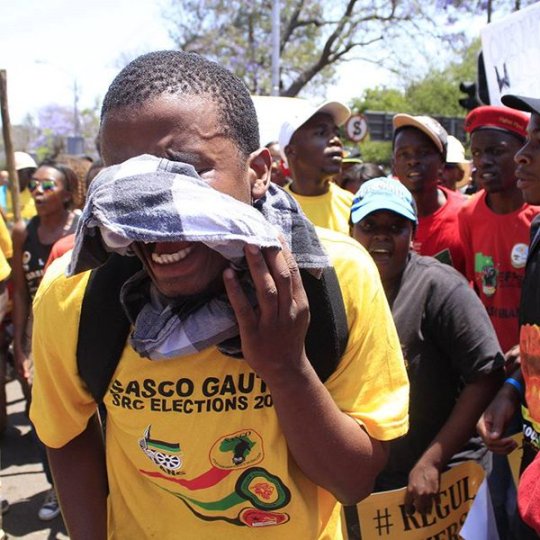
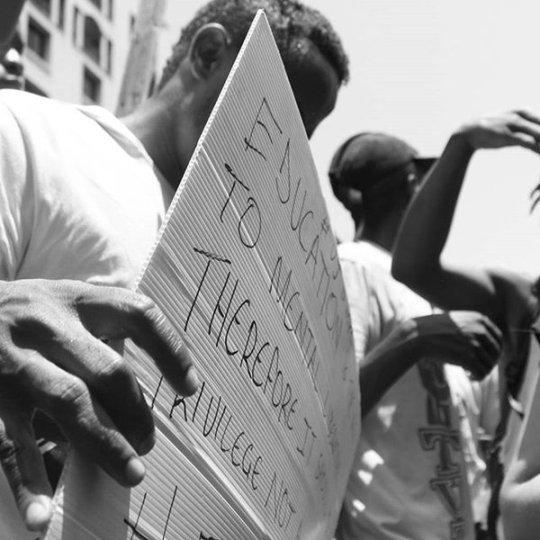
#feesmustfall Campaign in Johannesburg ,South Africa
0 notes
Text
#WitsFeesMustFall
“ Give us chance, help us advance cause we’re trying. Ignoring our whole plea watching us in disgust then they beg when our guns bust. They don't give fuck about us” Tupac Shakur
0 notes
Text
University of the Witwatersrand (Wits)
> If you are lecturer or tutor they need help for the daily studying periods. They have #ProtestNPass on Twitter for organising exam and study support.
> As of Thurs 22Oct, 6pm, Wits reported a surplus of food. Where possible, widen this to include first aid kits as well, as well as things like asthma pumps, buffs and protective gear.
> Gift of the Givers is providing food to Wits students and protesters in JHB. You can also donate to them to support their efforts.
SUPPORT: Go in the evening around 19h30ish to Senate House. That is where food etc. is usually provided for students so you can just give it to whomever is in charge that evening.
DONATIONS: Joel Quirk, FNB, a/c: 62345349783, Branch Code:250655
For international donations: The swift code for the WitsFNB account is FIRNZAJJ.
Paypal donations: [email protected]
#WitsFeesWillFall#witsfeesmustfall#feesmustfall#protestnpass#protestandpass#endoutsourcing#nationalshutdown#unispecific#donations#tutoring#givetime
0 notes
Photo
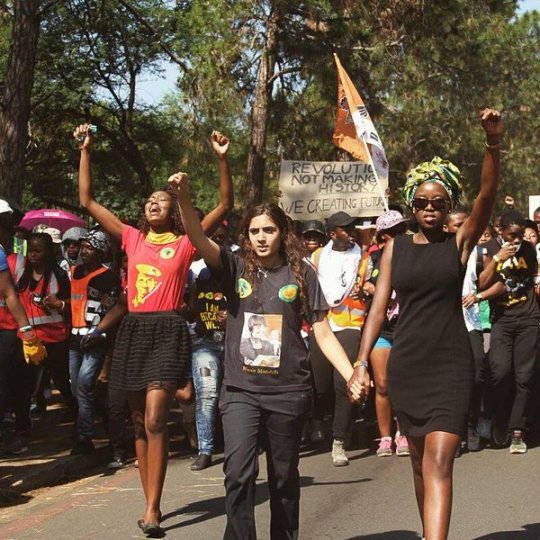
In the fore, Shaeera Kalla and Nompendulo Mkhatshwa. Who is the woman in the red?
(via @produkes on twitter)
4 notes
·
View notes
Photo
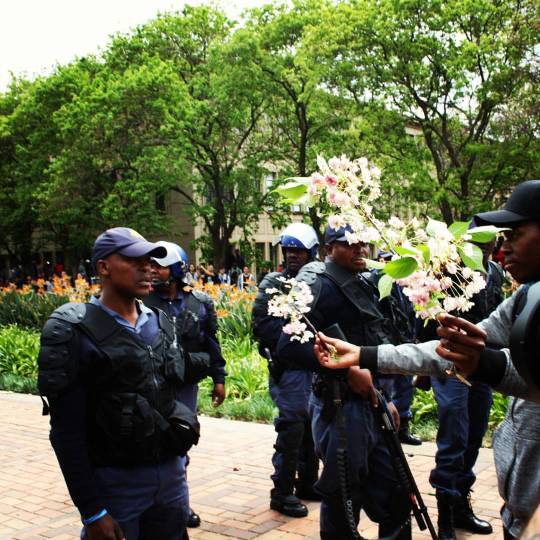
Student offers flower to the police in the midst of rubber bullets, stun grenades and tear gas bombs . Powerful way that this student chose to get his point across. #feesmustfall #wits #witsfeesmustfall #witsshutdown #southafrica #studentaffairs #FreeEducationSA
0 notes